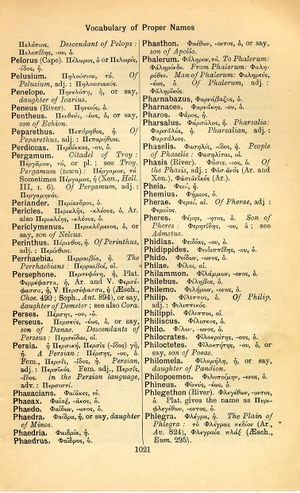Phaedrus
τίκτει γὰρ κόρος ὕβριν, ὅταν πολὺς ὄλβος ἕπηται ἀνθρώποις ὁπ̣όσοις μὴ νόος ἄρτιος ἦι → satiety breeds arrogance whenever men with unfit minds have great wealth
English > Greek (Woodhouse)
Φαῖδρος, ὁ.
Latin > English (Lewis & Short)
Phaedrus: (nom. PHAEDER, Inscr. Grut. 1111, 3), i, m., = Φαῖδρος.
I A pupil of Socrates, a native of Myrsinus, in Attica, after whom Plato named one of his dialogues, Cic. de Or. 1, 7, 28; id. Or. 4, 15; 12, 39; id. Fin. 2, 2, 4; id. Tusc. 1, 22, 53 al. —
II An Epicurean philosopher of Athens, an instructor of Cicero, Cic. Fam. 13, 1, 2; id. Fin. 1, 5, 16; id. N. D. 1, 33, 93; id. Phil. 5, 5, 13.—
III A freedman of Augustus, a Thracian by birth, and author of some well-known Latin fables.
Latin > French (Gaffiot 2016)
Phædrus,¹⁵ drī, m. (Φαῖδρος),
1 un des disciples de Socrate dont Platon prit le nom comme titre d’un dialogue [le Phèdre] : Cic. Tusc. 1, 53
2 philosophe épicurien : Cic. Fam. 13, 1, 2
3 Phèdre [fabuliste].

